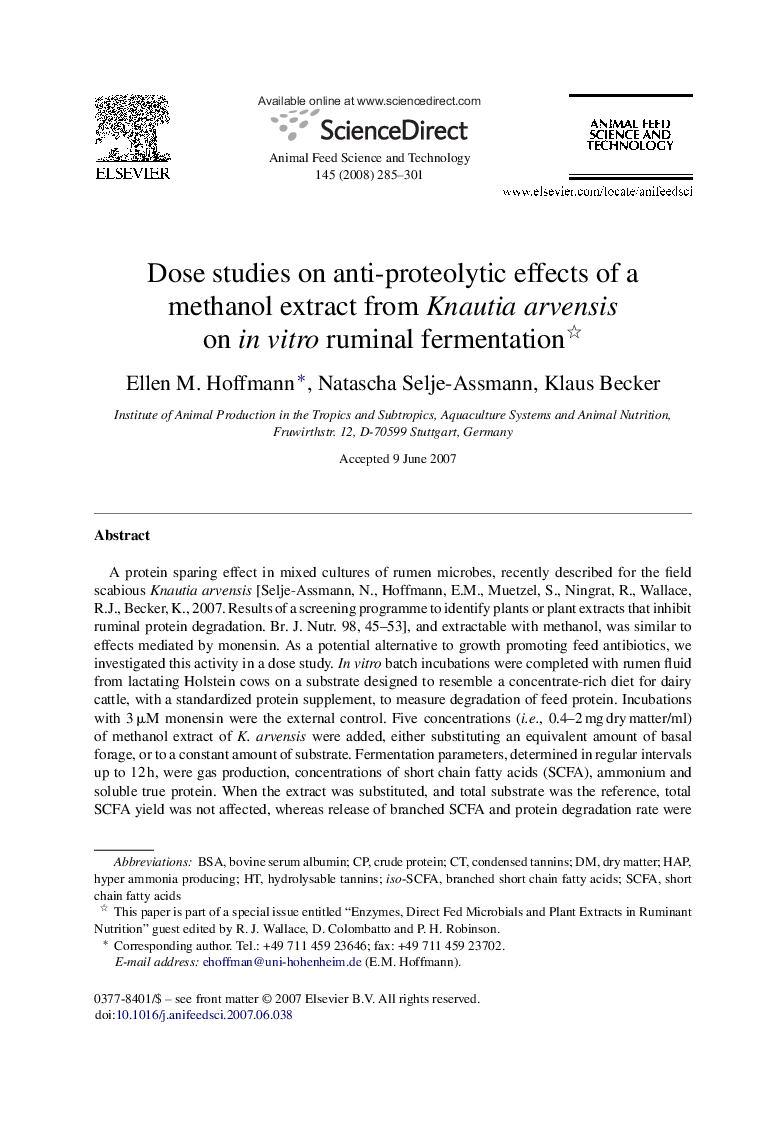| کد مقاله | کد نشریه | سال انتشار | مقاله انگلیسی | نسخه تمام متن |
|---|---|---|---|---|
| 2420642 | 1552467 | 2008 | 17 صفحه PDF | دانلود رایگان |

A protein sparing effect in mixed cultures of rumen microbes, recently described for the field scabious Knautia arvensis [Selje-Assmann, N., Hoffmann, E.M., Muetzel, S., Ningrat, R., Wallace, R.J., Becker, K., 2007. Results of a screening programme to identify plants or plant extracts that inhibit ruminal protein degradation. Br. J. Nutr. 98, 45–53], and extractable with methanol, was similar to effects mediated by monensin. As a potential alternative to growth promoting feed antibiotics, we investigated this activity in a dose study. In vitro batch incubations were completed with rumen fluid from lactating Holstein cows on a substrate designed to resemble a concentrate-rich diet for dairy cattle, with a standardized protein supplement, to measure degradation of feed protein. Incubations with 3 μM monensin were the external control. Five concentrations (i.e., 0.4–2 mg dry matter/ml) of methanol extract of K. arvensis were added, either substituting an equivalent amount of basal forage, or to a constant amount of substrate. Fermentation parameters, determined in regular intervals up to 12 h, were gas production, concentrations of short chain fatty acids (SCFA), ammonium and soluble true protein. When the extract was substituted, and total substrate was the reference, total SCFA yield was not affected, whereas release of branched SCFA and protein degradation rate were reduced in a dose-dependent manner by a maximum of ∼60%. Propionate proportion increased with extract dose by up to ∼15%, and effects could be modeled by linear regression with high correlation coefficients. Ammonium concentration decreased above the threshold concentration of 0.8 mg/ml by ∼14%. However 3 μM monensin, under the same conditions, decreased branched SCFA and protein degradation rate by ∼36%, ammonium by 5% and increased propionate proportion by 28%. When the extract was added to a constant amount of substrate, rather than replacing forage, effects on protein degradation were more pronounced. In vitro results suggest that K. arvensis has the potential to increase rumen protein escape in ruminant diets, and thus improve N use efficiency in vivo. The methanol extractability of the active component provides perspective for development of a standardized additive from this plant material that may be applicable in dairy cattle feeding systems, although its in vivo efficacy and persistency still need to be demonstrated.
Journal: Animal Feed Science and Technology - Volume 145, Issues 1–4, 14 August 2008, Pages 285–301